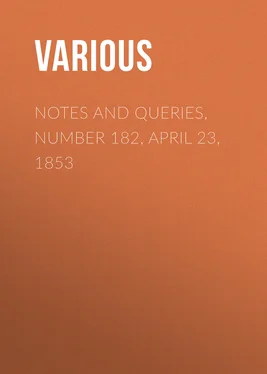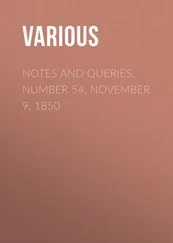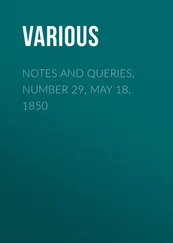Various - Notes and Queries, Number 182, April 23, 1853
Здесь есть возможность читать онлайн «Various - Notes and Queries, Number 182, April 23, 1853» — ознакомительный отрывок электронной книги совершенно бесплатно, а после прочтения отрывка купить полную версию. В некоторых случаях можно слушать аудио, скачать через торрент в формате fb2 и присутствует краткое содержание. Жанр: foreign_antique, periodic, foreign_edu, на английском языке. Описание произведения, (предисловие) а так же отзывы посетителей доступны на портале библиотеки ЛибКат.
- Название:Notes and Queries, Number 182, April 23, 1853
- Автор:
- Жанр:
- Год:неизвестен
- ISBN:нет данных
- Рейтинг книги:3 / 5. Голосов: 1
-
Избранное:Добавить в избранное
- Отзывы:
-
Ваша оценка:
- 60
- 1
- 2
- 3
- 4
- 5
Notes and Queries, Number 182, April 23, 1853: краткое содержание, описание и аннотация
Предлагаем к чтению аннотацию, описание, краткое содержание или предисловие (зависит от того, что написал сам автор книги «Notes and Queries, Number 182, April 23, 1853»). Если вы не нашли необходимую информацию о книге — напишите в комментариях, мы постараемся отыскать её.
Notes and Queries, Number 182, April 23, 1853 — читать онлайн ознакомительный отрывок
Ниже представлен текст книги, разбитый по страницам. Система сохранения места последней прочитанной страницы, позволяет с удобством читать онлайн бесплатно книгу «Notes and Queries, Number 182, April 23, 1853», без необходимости каждый раз заново искать на чём Вы остановились. Поставьте закладку, и сможете в любой момент перейти на страницу, на которой закончили чтение.
Интервал:
Закладка:
"Why this is wondrous being blind of sight,
His deep perseuerance should be such to know us."
I subjoin the promised dozen:
"For his dyet he was verie temperate, and a great enemie of excesse and surfetting; and so carelesse of delicates, as though he had had no perseuerance in the tast of meates," &c.—"The Life of Ariosto," Sir John Harington's Translation of Orlando Furioso , p. 418.
"In regarde whereof they are tyed vnto these duties: First by a prudent, diligent, and faithfull care to obserue by what things the state may be most benefited; and to haue perseuerance where such marchandize that the state most vseth and desireth may be had with greatest ease," &c.— The Trauailer , by Thomas Palmer: London, 1606.
"There are certain kinds of frogs in Egypt, about the floud of Nilus, that have this percewerance , that when by chance they happen to come where a fish called Varus is, which is great a murtherer and spoiler of frogs, they use to bear in their mouths overthwart a long reed, which groweth about the banks of Nile; and as this fish doth gape, thinking to feed upon the frog, the reed is so long that by no means he can swallow the frog; and so they save their lives."—"The Pilgrimage of Kings and Princes," chap. xliii. p. 294. of Lloyd's Marrow of History , corrected and revised by R. C., Master of Arts: London, 1653.
"This fashion of countinge the monthe endured to the ccccl yere of the citie, and was kepte secrete among the byshops of theyr religion tyl the time that C. Flauius, P. Sulpitius Auarrio, and P. Sempronius Sophuilongus, then beinge Consuls, against the mynde of the Senatours disclosed all their solemne feates, published the in a table that euery man might haue perseuerauce of them."— An Abridgemente of the Notable Worke of Polidore Vergile, &c. , by Thomas Langley, fol. xlii.
"And some there be that thinke men toke occasion of God to make ymages, whiche wylling to shewe to the grosse wyttes of men some perceiueraunce of hymselfe, toke on him the shape of man, as Abraham sawe him and Jacob also."— Id. , fol. lxi.
In this passage, as in others presently to be alleged, "notification" seems to be the drift of the word.
"Of this vnreuerent religio, Mahomete, a noble mane, borne in Arabie, or, as some report, in Persie, was authour: and his father was an heathen idolater, and his mother an Ismaelite; wherfore she had more perceuerance of the Hebrues law."— Id. , fol. cxlii.
"Where all feelyng and perseuerace of euill is awaie, nothyng there is euill or found a misse. As if a manne be fallen into a sound slepe, he feleth not the hardenesse or other incommoditie of his cabon or couche."—"The Saiynges of Publius, No. 58.," The Precepts of Cato, &c., with Erasmus Annotations : London, 1550.
"Wherfore both Philip and Alexander (if y edead haue anie perceuerance ) woulde not that the rootes (rooters) out of them and theyre issue, but rather that the punnishers of those traitors, should enioye the kingdom of Macedone."—"The XVI Booke of Justine," fol. 86., Golding's Translation of the Abridgement of the Historyes of Trojus Pompeius : London, 1578.
"And morouer bycause his setting of vs here in this world is to aduaunce vs aloft, that is, to witte to the heauenly life, whereof he giueth vs some perceyuerance and feeling afore hande."—Io. Calvin. "Sermon XLI., on the Tenth Chap. of Job," p. 209., Golding's Translation: London, 1574.
"And so farre are wee off from being able to atteine to such knowledge through our owne power, that we flee it as much as is possible, and blindfold our own eyes, to the intent we might put away all perceyuerance and feeling of God's judgement from vs."— Id. , "Sermon XLII.," p. 218.
"For (as I haue touched already) God of his goodnesse doth not vtterly barre vs from hauing any perceyuerance at all of his wisdome: but it behoueth vs to keepe measure."— Id. , "Sermon XLIII.," p. 219.
I shall not cite any more from Golding, but simply observe that the word occurs again and again in his translations. The remaining three examples exhibit the noun in a somewhat different sense, viz. "notification," or "means of discerning:"
"The time most apt in all the yeare, and affoording greatest perseuerance for the finding out of the heads of wells and fountaines, are the moneths of August or September."— The First Booke of the Countrie Farme , p. 8., by Stevens and Liebault, translated by Svrflet, and edited by G. Markham: London, 1616.
"He may also gather some perceiuerance by the other markes before specified; that is to say, by the prints of his foote vpon the grasse, by the carriages of his head, his dung, gate," &c.— Id. , booke vii. p. 685.
"And this lyfe to men is an high perseveraunce ,
Or a lyght of faythe wherby they shall be saved."
"God's Promises," by John Bale; Dodsley's Old Plays (Collier's edition), vol. i. Part II. Act I.
By-the-bye, as a specimen of the value of this edition, take the following passage of this very play:
"O perfyght keye of David, and hygh scepture of the kyndred of Jacob; whych openest and no man speareth , that speakest and no man openeth."—Act VII. p. 40.
On the word speareth the commentator treats his reader to a note; in which he informs him that speareth means "asketh," and in proof of this cites one passage from Chaucer, and two from Douglas's Virgil . It might almost appear to be upbraiding the reader with stupidity to mention that speareth signifieth "bolteth, shutteth;" and that "speaketh" is a misprint for speareth . This verb was a favourite with Bale. One word more closes my budget for the present.
More , a root. Still in use in Gloucestershire, once of frequent occurrence. To the examples alleged by Richardson, in his Dictionary , add the following:
"I se it by ensaunple
In somer tyme on trowes;
Ther some bowes ben leved,
And some bereth none,
There is a meschief in the more
Of swiche manere bowes."
At p. 302. you find the sentiment in Latin:
"Sicut cum videris arborem pallidam et marcidam, intelligis quod vitium habet in radice "—"a meschief in the more ."
The Glossary of the editor is silent.
"It is a ful trie tree, quod he,
Trewely to telle;
Mercy is the more therof,
The myddul stok is ruthe;
The leves ben lele wordes,
The lawe of holy chirche;
The blosmes beth buxom speche,
And benigne lokynge;
Pacience hatte the pure tree," &c.
"It groweth in a gardyn, quod he,
That God made hymselve,
Amyddes mannes body,
The more is of that stokke,
Herte highte the herber,
That it inne groweth."
There should not be any comma, or other stop, at body, because the sense is—"The root of that stock is amid man's body."
Mr. Wright's Glossary refers to these last two instances as follows:
" More (A.-S.) 330, 331., the main or larger part, body (?)"
At p. 334. we meet with the word again:
"On o more thei growed."
And again, at p. 416.:
"And bite a-two the mores ."
May I, in passing, venture to inquire of the editor on what authority he explains waselede (p. 476.) to be "the pret. of waselen (A.-S.) to become dirty, dirty oneself?"
"This Troilus withouten rede or lore,
As man that hath his joies eke forlore,
Was waiting on his lady evermore,
As she that was sothfast croppe and more ,
Of all his lust or joyes here tofore."
Интервал:
Закладка:
Похожие книги на «Notes and Queries, Number 182, April 23, 1853»
Представляем Вашему вниманию похожие книги на «Notes and Queries, Number 182, April 23, 1853» списком для выбора. Мы отобрали схожую по названию и смыслу литературу в надежде предоставить читателям больше вариантов отыскать новые, интересные, ещё непрочитанные произведения.
Обсуждение, отзывы о книге «Notes and Queries, Number 182, April 23, 1853» и просто собственные мнения читателей. Оставьте ваши комментарии, напишите, что Вы думаете о произведении, его смысле или главных героях. Укажите что конкретно понравилось, а что нет, и почему Вы так считаете.












